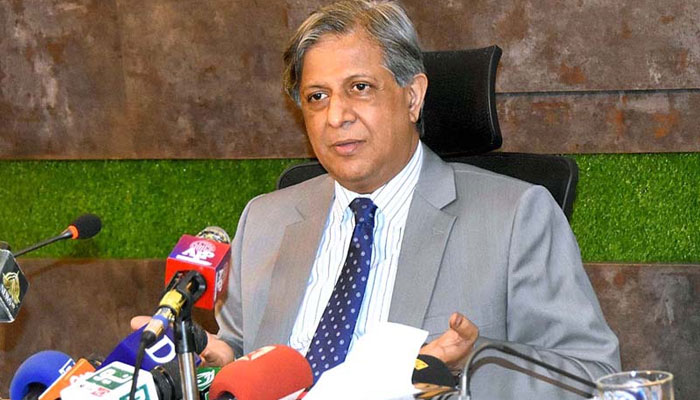Azam Nazir Tarar’s resignation saga
Senator Azam Nazir Tarar has resumed work as the law minister, but the real cause behind his resignation, which he tendered a month ago citing “personal reasons,” is yet to be determined
ISLAMABAD: Senator Azam Nazir Tarar has resumed work as the law minister, but the real cause behind his resignation, which he tendered a month ago citing “personal reasons,” is yet to be determined.
The silence observed by Prime Minister Shehbaz Sharif during that time is also intriguing. He chose to break that (silence) only late Tuesday, which coincided with the change in command in Rawalpindi. PM Sharif sent a delegation of ministers to Tarar to persuade him to retract his resignation, which he did.
Tarar was not available for comments, but different explanations are being given in this regard.
Two important developments took place shortly before his resignation: the Judicial Commission of Pakistan meeting, which approved the names of four high court judges for their elevation to the Supreme Court, and the Asma Jehangir Conference, where anti-army slogans were chanted.
The government’s representatives, law minister Tarar and attorney general Ashtar Ausaf, had not endorsed three names recommended by Chief Justice of Pakistan Umar Ata Bandial in the earlier meeting, and a couple of SC judges who also vetoed had publicised their dissenting views against the CJP’s nominees. In the meeting that followed on Oct 24, Tarar and Ausaf consented in favour of CJP’s recommendations.
This created a lot of controversy about why the government changed its mind. As the Supreme Court Bar’s elections neared, Tarar’s resignation was interpreted as a decision triggered by the bar’s politics. However, an informed source dismissed this impression. Tarar, according to the source, wasn’t in opposition to the government’s decision.
Instead, he said the government should avoid confrontation with the Supreme Court’s leadership given the relationship’s tumultuous history over the last five years, which included Nawaz Sharif’s disqualification and other negative decisions against the PMLN. He and Ausaf were on the same page and rather persuaded the government to arrive at this decision. Had these nominations been the issue, the source contends, Tarar would have resigned before voting in favour of CJP’s nominees.
A source privy to details considers the Asma Jehangir Conference rather consequential. Tarar was sitting on the stage when some Pashtun students chanted slogans that didn’t go well with the leadership of the army on Oct 23. The outgoing chief, Gen. Qamar Javed Bajwa, expressed his strong displeasure to a PMLN leader in Lahore who had been acting as a liaison between the now-former chief and the Sharifs. The message was very clear. The resignation of the law minister was demanded. Although, Tarar thought he was not at fault because he was not in control of the audience, nevertheless, he considered it better to resign lest any resistance could have a consequential impact on the government when the transition in army leadership was around the corner.
Tarar resigned on Oct 25, and PM Sharif, in the meantime, gave the minister of parliamentary affairs, Ayaz Sadiq, an additional portfolio of the law ministry. However, Tarar’s resignation wasn’t accepted. No sooner had the change in command taken place in Rawalpindi, than a delegation was sent to Tarar to take back the resignation.
-
 Andrew, Sarah Ferguson Refuse King Charles Request: 'Raising Eyebrows Inside Palace'
Andrew, Sarah Ferguson Refuse King Charles Request: 'Raising Eyebrows Inside Palace' -
 Adam Sandler Reveals How Tom Cruise Introduced Him To Paul Thomas Anderson
Adam Sandler Reveals How Tom Cruise Introduced Him To Paul Thomas Anderson -
 Washington Post CEO William Lewis Resigns After Sweeping Layoffs
Washington Post CEO William Lewis Resigns After Sweeping Layoffs -
 North Korea To Hold 9th Workers’ Party Congress In Late February
North Korea To Hold 9th Workers’ Party Congress In Late February -
 All You Need To Know Guide To Rosacea
All You Need To Know Guide To Rosacea -
 Princess Diana's Brother 'handed Over' Althorp House To Marion And Her Family
Princess Diana's Brother 'handed Over' Althorp House To Marion And Her Family -
 Trump Mobile T1 Phone Resurfaces With New Specs, Higher Price
Trump Mobile T1 Phone Resurfaces With New Specs, Higher Price -
 Factory Explosion In North China Leaves Eight Dead
Factory Explosion In North China Leaves Eight Dead -
 Blac Chyna Opens Up About Her Kids: ‘Disturb Their Inner Child'
Blac Chyna Opens Up About Her Kids: ‘Disturb Their Inner Child' -
 Winter Olympics 2026: Milan Protestors Rally Against The Games As Environmentally, Economically ‘unsustainable’
Winter Olympics 2026: Milan Protestors Rally Against The Games As Environmentally, Economically ‘unsustainable’ -
 How Long Is The Super Bowl? Average Game Time And Halftime Show Explained
How Long Is The Super Bowl? Average Game Time And Halftime Show Explained -
 Natasha Bure Makes Stunning Confession About Her Marriage To Bradley Steven Perry
Natasha Bure Makes Stunning Confession About Her Marriage To Bradley Steven Perry -
 ChatGPT Caricature Prompts Are Going Viral. Here’s List You Must Try
ChatGPT Caricature Prompts Are Going Viral. Here’s List You Must Try -
 James Pearce Jr. Arrested In Florida After Alleged Domestic Dispute, Falcons Respond
James Pearce Jr. Arrested In Florida After Alleged Domestic Dispute, Falcons Respond -
 Cavaliers Vs Kings: James Harden Shines Late In Cleveland Debut Win
Cavaliers Vs Kings: James Harden Shines Late In Cleveland Debut Win -
 2026 Winter Olympics Snowboarding: Su Yiming Wins Bronze And Completes Medal Set
2026 Winter Olympics Snowboarding: Su Yiming Wins Bronze And Completes Medal Set




